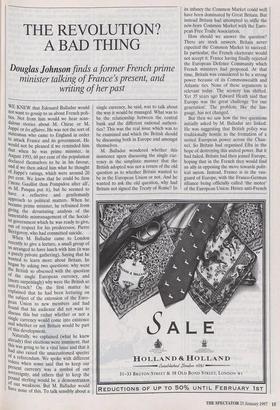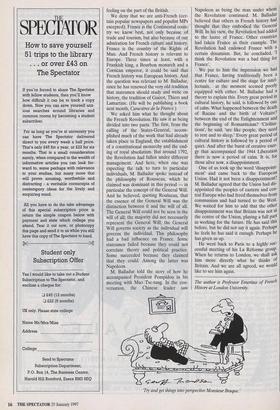THE REVOLUTION?
A BAD THING
Douglas Johnson finds a former French prime
minister talking of France's present, and writing of her past
WE KNEW that Edouard Balladur would not want to gossip to us about French poli- tics. Not from him would we hear scan- dalous stories about M. Chirac or M. JuPPe. or les affaires. He was not the sort of statesman who came to England in order to attack France and its government. He Would not be pleased if we reminded him that when he was prime minister, in August 1993, 60 per cent of the population declared themselves to be in his favour, and if we then asked him what he thought of Juppe's ratings, which were around 20 Per cent. We knew that he could be firm (`rnore Gaullist than Pompidou after all', as M. Pasqua put it), but he seemed to have a reflective and gentlemanly approach to political matters. When he became prime minister, he refrained from Plug the devastating analysis of the lamentable mismanagement of the Social- ist government which he was ready to give, out of respect for his predecessor, Pierre Reregovoy, who had committed suicide. When M. Balladur came to London recently to give a lecture, a small group of IS arranged to have lunch with him (it was a Purely private gathering). Saying that he wanted to learn more about Britain, he began by asking two questions: why were the British so obsessed with the question of the single European currency, and (more surprisingly) why were the British so anti-French? On the first matter he explained that he had been lecturing on the subject of the extension of the Euro- Pean Union to new members and had found that his audience did not want to discuss this but rather whether or not a single currency would come into existence and whether or not Britain would be part Of this development. Naturally, we explained (what he knew already) that elections were imminent, that this was going to be a vital issue and that it had also raised the unaccustomed spectre of a referendum. We spoke with different voices when some said that to keep our Present currency was a symbol of our sovereignty, and others that to keep the Pound sterling would be a demonstration (,)f our weakness. But M. Balladur would have none of this. To talk sensibly about a single currency, he said, was to talk about the way it would be managed. What was to be the relationship between the central bank and the different national authori- ties? This was the real issue which was to be examined and which the British should be discussing both in Europe and amongst themselves.
M. Balladur wondered whether this insistence upon discussing the single cur- rency in the simplistic manner that the British adopted was not a return of the old question as to whether Britain wanted to be in the European Union or not. And he wanted to ask the old question, why had Britain not signed the Treaty of Rome? In its infancy the Common Market could well have been dominated by Great Britain. But instead Britain had attempted to stifle the new-born Common Market with the Euro- pean Free Trade Association.
How should we answer the question? There are stock answers. Britain never expected the Common Market to succeed. In particular, the French electorate would not accept it: France having finally rejected the European Defence Community which French ministers had proposed. At that time, Britain was considered to be a strong power because of its Commonwealth and Atlantic ties. None of these arguments is relevant today. The scenery has shifted. Yet 35 years ago Edward Heath said that Europe was the great challenge 'for our generation'. The problem, like the lan- guage, has not changed.
But then we saw how the two questions initially asked by M. Balladur are linked. He was suggesting that British policy was traditionally hostile to the formation of a united European power across the Chan- nel. So Britain had organised Efta in the hope of destroying this united power. But it had failed. Britain had then joined Europe, hoping that in the French they would find an ally in opposing the move towards polit- ical union. Instead, France is in the van- guard of Europe, with the Franco-German alliance being officially called 'the motor' of the European Union. Hence anti-French feeling on the part of the British.
We deny that we are anti-French (cer- tain popular newspapers and populist MPs excepted). France is the Continental coun- try we know best, not only because of trade and tourism, but also because of our admiration for French culture and history. France is the country of the Rights of Man. And French history is relevant to Europe. Three times at least, with a Frankish king, a Bourbon monarch and a Corsican emperor, it could be said that French history was European history. And the question was relevant to M. Balladur, since he has renewed the very old tradition that statesmen should study and write on history, the tradition of Guizot, Thiers and Lamartine. (He will be publishing a book next month, Caracteres de la France.) We asked him what he thought about the French Revolution. He saw it as being divided into two parts. The first, from the calling of the States-General, accom- plished much of the work that had already taken place in England, the establishment of a constitutional monarchy and the end- ing of royal absolutism. But around 1792, the Revolution had fallen under different management. And here, when one was expecting the talk to turn to particular individuals, M. Balladur spoke instead of the philosophy of Rousseau, which he claimed was dominant in this period — in particular the concept of the General Will. And he believed, quoting Rousseau, that the essence of the General Will was the distinction between it and the will of all. The General Will could not be seen in the will of all; the majority did not necessarily represent the General Will; the General Will governs society as the individual will governs the individual. This philosophy had a bad influence on France. Some statesmen failed because they could not correlate theory and political practice. Some succeeded because they claimed that they could. Among the latter was Napoleon.
M. Balladur told the story of how he accompanied President Pompidou in his meeting with Mao Tse-tung. In the con- versation, the Chinese leader saw Napoleon as being the man under whom the Revolution continued. M. Balladur believed that others in French history had thought that they embodied the General Will. In his view, the Revolution had added to the lustre of France. Other countries had taken France as their example. The Revolution had endowed France with a certain dynamism. But, he concluded, 'I think the Revolution was a bad thing for France'.
We put to him the impression we had that France, having traditionally been a centre for culture and the stage for intel- lectuals, at the moment seemed poorly equipped with either. M. Balladur had a theory to explain this. Every great period in cultural history, he said, is followed by one of calm. What happened between the death of Racine and the birth of Voltaire? between the end of the Enlightenment and the beginning of Romanticism? 'Civilisa- tions', he said, 'are like people, they need to rest and to sleep.' Every great period of cultural history is followed by a period of quiet. And after the burst of creative ener- gy that accompanied the 1944 Liberation there is now a period of calm. It is, for those alive now, a disappointment.
One of us took up the word 'disappoint- ment' and came back to the European Union. Had it not been a disappointment? M. Balladur agreed that the Union had dis- appointed the peoples of eastern and cen- tral Europe who had freed themselves from communism and had turned to the West. We waited for him to add that the other disappointment was that Britain was not at the centre of the Union, playing a full part in working for the future. He has said this before, but he did not say it again. Perhaps he feels he has said it enough. Perhaps he has given us up.
He went back to Paris to a highly suc- cessful meeting of his La Reforme group. When he returns to London, we shall ask him more directly what he thinks of Britain. And we are all agreed, we would like to see him again.
The author is Professor Emeritus of French History at London University.
`Try and get things into perspective Monsieur Braque.'



































































 Previous page
Previous page